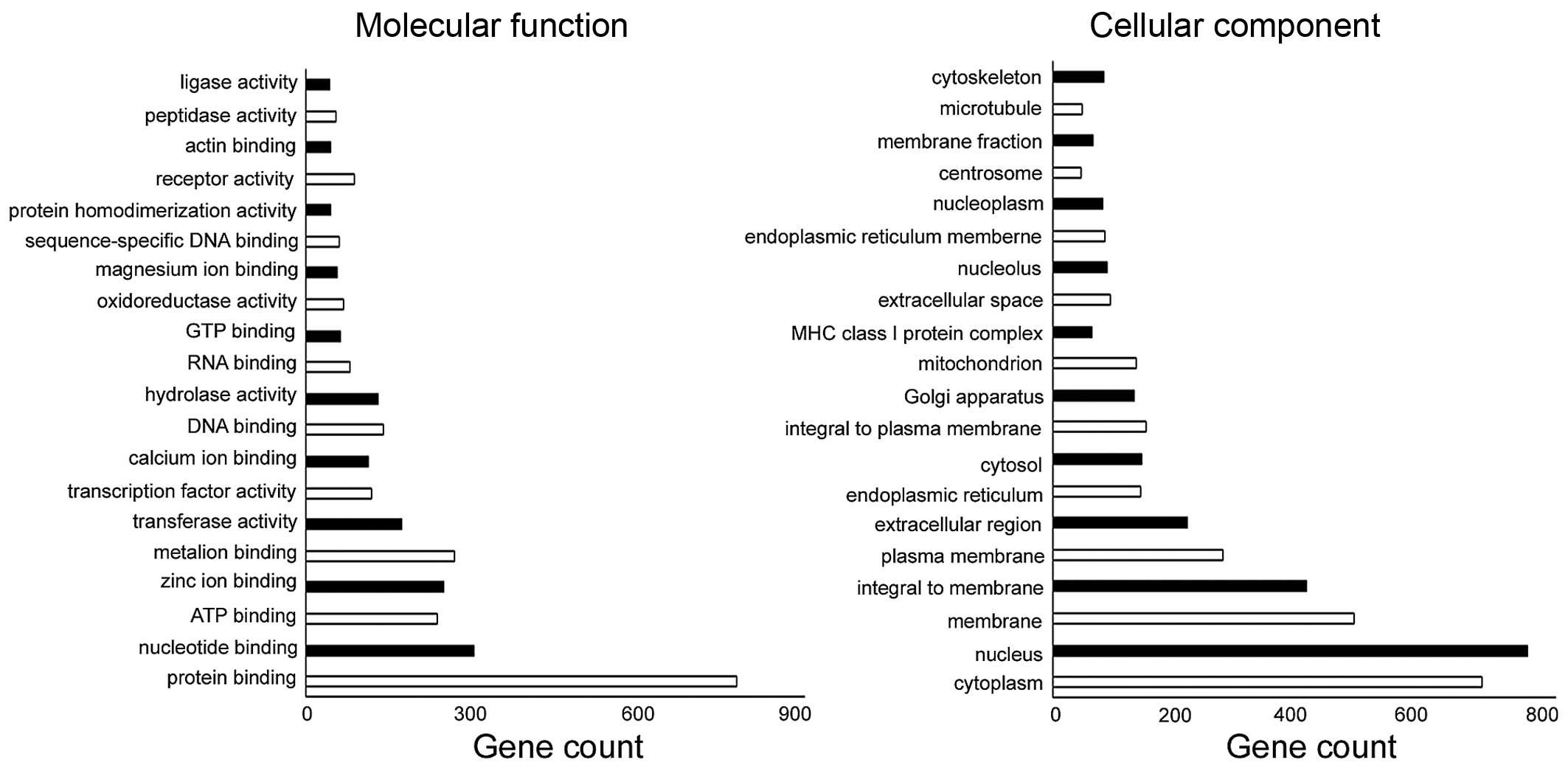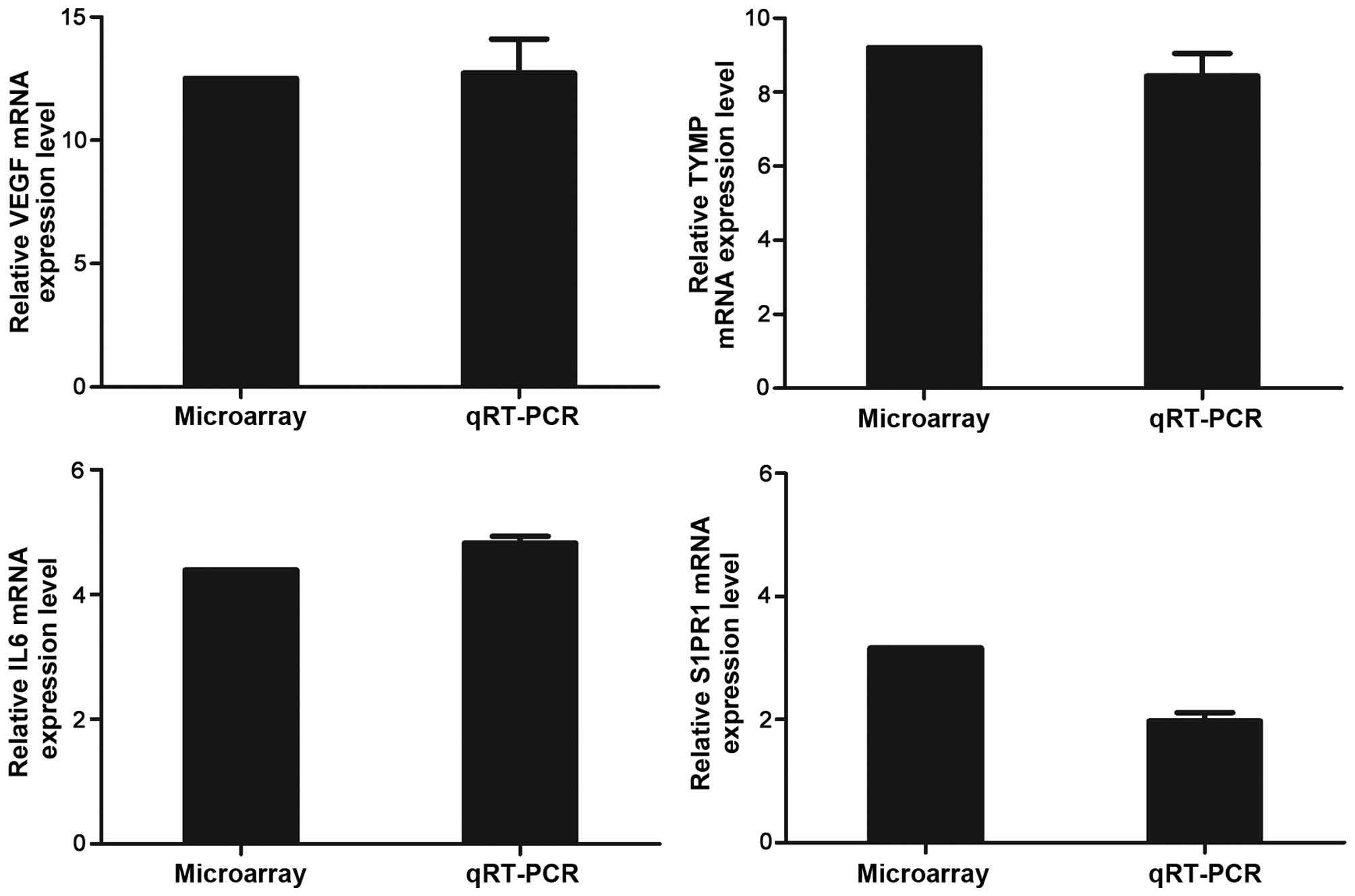|
1
|
Miura S, Mitsui K, Heishi T, Shukunami C,
Sekiguchi K, Kondo J, Sato Y and Hiraki Y: Impairment of
VEGF-A-stimulated lamellipodial extensions and motility of vascular
endothelial cells by chondromodulin-I, a cartilage-derived
angiogenesis inhibitor. Exp Cell Res. 316:775–788. 2010. View Article : Google Scholar
|
|
2
|
Park HJ, Kim MN, Kim JG, Bae YH, Bae MK,
Wee HJ, Kim TW, Kim BS, Kim JB, Bae SK, et al: Up-regulation of
VEGF expression by NGF that enhances reparative angiogenesis during
thymic regeneration in adult rat. Biochim Biophys Acta.
1773:1462–1472. 2007. View Article : Google Scholar : PubMed/NCBI
|
|
3
|
Folkman J: Anti-angiogenesis: New concept
for therapy of solid tumors. Ann Surg. 175:409–416. 1972.
View Article : Google Scholar : PubMed/NCBI
|
|
4
|
Abajo A, Bitarte N, Zarate R, Boni V,
Lopez I, Gonzalez-Huarriz M, Rodriguez J, Bandres E and
Garcia-Foncillas J: Identification of colorectal cancer metastasis
markers by an angiogenesis-related cytokine-antibody array. World J
Gastroenterol. 18:637–645. 2012. View Article : Google Scholar : PubMed/NCBI
|
|
5
|
Liu YR, Guan YY, Luan X, Lu Q, Wang C, Liu
HJ, Gao YG, Yang SC, Dong X, Chen HZ, et al: Delta-like ligand
4-targeted nanomedicine for antiangiogenic cancer therapy.
Biomaterials. 42:161–171. 2015. View Article : Google Scholar
|
|
6
|
Weis SM and Cheresh DA: Tumor
angiogenesis: Molecular pathways and therapeutic targets. Nat Med.
17:1359–1370. 2011. View
Article : Google Scholar : PubMed/NCBI
|
|
7
|
Weis SM and Cheresh DA: Pathophysiological
consequences of VEGF-induced vascular permeability. Nature.
437:497–504. 2005. View Article : Google Scholar : PubMed/NCBI
|
|
8
|
Lu J, Zhao J, Liu K, Zhao J, Yang H, Huang
Y, Qin Z, Bai R, Li P, Ma J, et al: MAPK/ERK1/2 signaling mediates
endothelial-like differentiation of immature DCs in the
microenvironment of esophageal squamous cell carcinoma. Cell Mol
Life Sci. 67:2091–2106. 2010. View Article : Google Scholar : PubMed/NCBI
|
|
9
|
Lu J, Bai R, Qin Z, Zhang Y, Zhang X,
Jiang Y, Yang H, Huang Y, Li G, Zhao M, et al: Differentiation of
immature DCs into endothelial-like cells in human esophageal
carcinoma tissue homogenates. Oncol Rep. 30:739–744.
2013.PubMed/NCBI
|
|
10
|
Hillen F and Griffioen AW: Tumour
vascularization: Sprouting angiogenesis and beyond. Cancer
Metastasis Rev. 26:489–502. 2007. View Article : Google Scholar : PubMed/NCBI
|
|
11
|
Wang XX, Wang K, Li XZ, Zhai LQ, Qu CX,
Zhao Y, Liu ZR, Wang HZ, An QJ, Jing LW, et al: Targeted knockdown
of IQGAP1 inhibits the progression of esophageal squamous cell
carcinoma in vitro and in vivo. PLoS One. 9:e965012014. View Article : Google Scholar : PubMed/NCBI
|
|
12
|
Bisacchi D, Benelli R, Vanzetto C, Ferrari
N, Tosetti F and Albini A: Anti-angiogenesis and angioprevention:
Mechanisms, problems and perspectives. Cancer Detect Prev.
27:229–238. 2003. View Article : Google Scholar : PubMed/NCBI
|
|
13
|
Carmeliet P and Jain RK: Molecular
mechanisms and clinical applications of angiogenesis. Nature.
473:298–307. 2011. View Article : Google Scholar : PubMed/NCBI
|
|
14
|
Kim BH, Lee Y, Yoo H, Cui M, Lee S, Kim
SY, Cho JU, Lee H, Yang BS, Kwon YG, et al: Anti-angiogenic
activity of thienopyridine derivative LCB03-0110 by targeting
VEGFR-2 and JAK/STAT3 signalling. Exp Dermatol. 24:503–509. 2015.
View Article : Google Scholar : PubMed/NCBI
|
|
15
|
Lu J, Bai R, Qin Z, Zhang Y, Zhang X,
Jiang Y, Yang H, Huang Y, Li G, Zhao M, et al: Differentiation of
immature DCs into endothelial-like cells in human esophageal
carcinoma tissue homogenates. Oncol Rep. 30:739–744.
2013.PubMed/NCBI
|
|
16
|
St Croix B, Rago C, Velculescu V, Traverso
G, Romans KE, Montgomery E, Lal A, Riggins GJ, Lengauer C,
Vogelstein B, et al: Genes expressed in human tumor endothelium.
Science. 289:1197–1202. 2000. View Article : Google Scholar : PubMed/NCBI
|
|
17
|
Finley SD and Popel AS: Effect of tumor
microenvironment on tumor VEGF during anti-VEGF treatment: Systems
biology predictions. J Natl Cancer Inst. 105:802–811. 2013.
View Article : Google Scholar : PubMed/NCBI
|
|
18
|
Jiang L, Yin M, Wei X, Liu J, Wang X, Niu
C, Kang X, Xu J, Zhou Z, Sun S, et al: Bach1 represses
Wnt/β-catenin signaling and angiogenesis. Circ Res. 117:364–375.
2015. View Article : Google Scholar : PubMed/NCBI
|
|
19
|
Severi T, van Malenstein H, Verslype C and
van Pelt JF: Tumor initiation and progression in hepatocellular
carcinoma: Risk factors, classification, and therapeutic targets.
Acta Pharmacol Sin. 31:1409–1420. 2010. View Article : Google Scholar : PubMed/NCBI
|
|
20
|
Gijsbers K, Gouwy M, Struyf S, Wuyts A,
Proost P, Opdenakker G, Penninckx F, Ectors N, Geboes K and Van
Damme J: GCP-2/CXCL6 synergizes with other endothelial cell-derived
chemokines in neutrophil mobilization and is associated with
angiogenesis in gastrointestinal tumors. Exp Cell Res. 303:331–342.
2005. View Article : Google Scholar : PubMed/NCBI
|
|
21
|
Lin ZY, Chuang WL and Chuang YH:
Amphotericin B up-regulates angiogenic genes in hepatocellular
carcinoma cell lines. Eur J Clin Invest. 39:239–245. 2009.
View Article : Google Scholar : PubMed/NCBI
|
|
22
|
Zhou Y and Nathans J: Gpr124 controls CNS
angiogenesis and blood-brain barrier integrity by promoting
ligand-specific canonical wnt signaling. Dev Cell. 31:248–256.
2014. View Article : Google Scholar : PubMed/NCBI
|
|
23
|
Arnon TI, Xu Y, Lo C, Pham T, An J,
Coughlin S, Dorn GW and Cyster JG: GRK2-dependent S1PR1
desensitization is required for lymphocytes to overcome their
attraction to blood. Science. 333:1898–1903. 2011. View Article : Google Scholar : PubMed/NCBI
|
|
24
|
Jain RK: Molecular regulation of vessel
maturation. Nat Med. 9:685–693. 2003. View Article : Google Scholar : PubMed/NCBI
|
|
25
|
Chae SS, Paik JH, Furneaux H and Hla T:
Requirement for sphingosine 1-phosphate receptor-1 in tumor
angiogenesis demonstrated by in vivo RNA interference. J Clin
Invest. 114:1082–1089. 2004. View Article : Google Scholar : PubMed/NCBI
|
|
26
|
Ciaparrone M, Quirino M, Schinzari G,
Zannoni G, Corsi DC, Vecchio FM, Cassano A, La Torre G and Barone
C: Predictive role of thymidylate synthase, dihydropyrimidine
dehydrogenase and thymidine phosphorylase expression in colorectal
cancer patients receiving adjuvant 5-fluorouracil. Oncology.
70:366–377. 2006. View Article : Google Scholar : PubMed/NCBI
|
|
27
|
Laudanski P, Charkiewicz R, Kuzmicki M,
Szamatowicz J, Świątecka J, Mroczko B and Niklinski J: Profiling of
selected angiogenesis-related genes in proliferative eutopic
endometrium of women with endometriosis. Eur J Obstet Gynecol
Reprod Biol. 172:85–92. 2014. View Article : Google Scholar
|
|
28
|
Mitselou A, Ioachim E, Skoufi U, Tsironis
C, Tsimogiannis KE, Skoufi C, Vougiouklakis T and Briasoulis E:
Predictive role of thymidine phosphorylase expression in patients
with colorectal cancer and its association with
angiogenesis-related proteins and extracellular matrix components.
In Vivo. 26:1057–1067. 2012.PubMed/NCBI
|


















